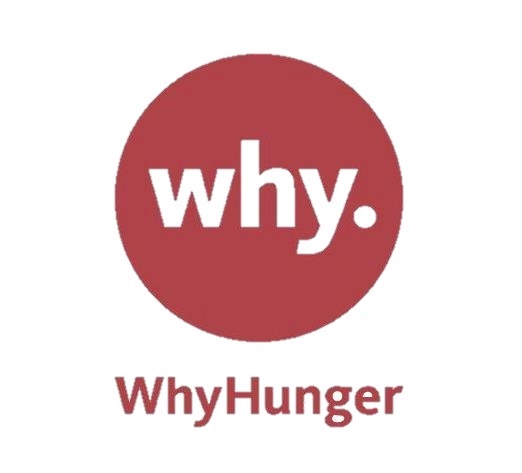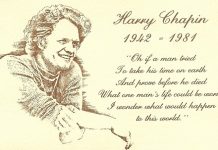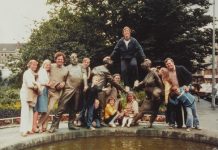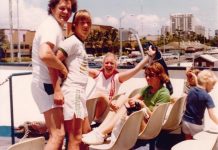By Ira Kantor
Photos Courtesy of Diane Maple & Chapin Productions LLC
The life of Harry Chapin, charismatic musician and iconic humanitarian, was unexpectedly and tragically taken on July 16, 1981. He was 38 years old.
A human dynamo whose sheer tenacity landed him on the Billboard charts, on Broadway, in the White House, and at the forefront of the world hunger movement, Chapin lived by the mantra of “When in doubt, do something.” In following this mentality, Chapin’s 10-year solo career encompassed more than 2,000 concerts, nine studio albums, the creation of global nonprofit World Hunger Year (now WhyHunger) and the love and respect of fans, fellow musicians and key political influencers alike.
Hailed as a consummate musical storyteller, Chapin is best known for his character-driven tunes —“Taxi,” “Sniper,” “W-O-L-D,” “A Better Place to Be,” “30,000 Pounds of Bananas” and “Cat’s in the Cradle” included. Yet despite having only four Top 40 hits to his name, Chapin’s songs remain one of a kind — elevating him to the same artistic status as classic singer-songwriters of the era like James Taylor, Jim Croce, Gordon Lightfoot and John Denver.
Nearly 40 years after his death, the following 10-part oral history seeks to tell Harry Chapin’s story through the firsthand, on-the-record testimonies of the “characters” who knew him best – more than 50 family members, friends, business and political associates and musical contemporaries. For added context, Harry’s own voice, along with other relevant news articles and reviews during his lifetime, are included in italics.
While there are other individuals and events crucial to Harry’s tale who were unable to be interviewed or showcased for this series, this still seeks to provide a well-rounded retrospective of a man whose life, being, sense of accomplishment and legacy remain unsurpassed to this day.
***
Chapter V
WHY
Harry Chapin (From a 1980 concert program): So here I was, a new career going strong, faced with the questions of what to do with it. All my brave words of the 60’s about the social responsibility of successful people became bluffs to be called. I believe that success brings responsibility. It also does not bring immunity to the consequences of our quickening march toward oblivious. The bottom line is that all of us should be involved in our futures to create a world that our children will want to live in. I met Father Bill Ayres in 1973, and after 15 months of meetings and planning sessions we founded World Hunger Year, a non-profit organization dedicated to giving a greater visibility to and higher priority for the solutions to mankind’s greatest problem, world hunger.
Bill Ayres (Friend, WhyHunger co-founder): In the beginning, I was the one who knew about hunger. I’d feed him books and after a while he started feeding me books. I mean he really got into it and he became very, very knowledgeable, very articulate, and a great spokesman.
He always was involved in humanitarian causes and helping various politicians that he agreed with get elected. But he never did hunger and poverty, to my knowledge. When I presented it to him and to Sandy, they both thought it was a great idea.
Sandy Chapin (Wife): Harry and Bill Ayres were going to organize a concert with the UN for Bangladesh and somehow along the way Harry’s education started to change that one march on Washington doesn’t change the world. One concert for Bangladesh doesn’t solve poverty and hunger. He met Frances Moore Lappe and was educated in the whole thing of you can’t treat the symptom; you have to get to the root causes. You can’t do charity — you have to create change and so forth and so on. She really was responsible, I think, for bringing people into a new approach and a new realization.
Bill Ayres: We made a sort of pledge to spend the rest of our lives dealing with hunger and poverty in some form or other. His form of course was doing these wonderful concerts and raising money. Half of all his concerts went to causes, mostly hunger. Then in ’75 we started this organization that we called WHY. I had suggested that because I had been influenced by the great Brazilian educator Pau Ophrera, who said, ‘You really need to ask the why questions:’ Why is there poverty, and why is there hunger in a world that can feed itself, and why is there hunger in the United States, the richest country in the world? We figured that would be a great name except when you answered the phone, if you said ‘WHY’ it would sound like an Abbott and Costello routine. We needed an acronym. The first two parts were easy — World Hunger, and then what do you do with the Y? That became Year.
When people asked (Harry) what year is world hunger, he’d say, ‘Every year until we end hunger.’
Fred Kewley (First Manager): I met a lot of people because of him. Harry was doing this thing with a lot of star people personalities — ‘I’ll do one for you if you do one for me.’ So if you wanted to get people involved doing an event for him, for world hunger or whatever, then he would agree to do a concert for whatever it is they were trying to do.

Bill Ayres: I was doing the radio show for WPLJ. It was a rock ‘n’ roll station; I was interviewing rock stars there. I came up with this idea of doing the hungerthon — taking over a radio station for a whole day and bringing people on who were experts in the field, and then also bringing on artists who would sing and talk about the issue as well. We did three of them in New York. We did a couple in San Francisco. We did Philadelphia, Washington, Dallas, Detroit, a couple of other places over the next few years.
One of the people who was sort of saying this in the field of international hunger was Frances Moore Lappe. She had written a book called “Diet for a Small Planet,” and then she and her partner Joe Collins wanted to write a book called “Food First” and Harry helped to fund that. We had both of them on. We also had people on from Oxfam and the Red Cross and all of the big agencies. But we also had people on from community-based organizations, as well as politicians. And musicians — people came on and sang. I remember Richie Havens coming on and Peter Yarrow. A number of people that were Harry’s friends would come on.
We’d stay up for 24 hours, but there was a little caveat in that because we would like start on Saturday morning, go until Sunday morning. It was 28 hours sometimes, 30, whatever. But a lot of times these stations would have some pre-recorded kind of public service show on Sunday morning, and they didn’t want to preempt that stuff. We said, ‘That’s OK,’ so we would take a nap. I mean we’d take a nap in the strangest places. One time we did it in the closet; we’d just stretch out on the floor. It would take me like 10 minutes or so to kind of unwind. It took Harry 10 seconds and he’d be out like a light. And they come wake us up and we were laying on a floor so it’s not comfortable but you’re so tired that you just go out. They wake us up and I’d be groggy, man, ‘I’d say awww,’ and Harry would be in the middle of a sentence. He would just start right over again and expected me to be awake, which of course I wasn’t.
Frances Moore Lappe (Friend, Author): The main memory I have of Harry is doing something that I’m now dreaming up to do again, but a combo of speaking and music. I don’t know how many concerts he did this way where he would donate the proceeds to “Food First.” Joe and I, we’d give a little rap about hunger and how it’s possible to solve it. Honestly at this point, I don’t remember how many times we did that but we felt totally on the same wavelength — building on people’s sense of possibility that we can solve this problem not just on guilt.
Then we also did radio interviews with Bill. Joe and I were on the radiothon; Harry was on the radiothon. It was kind of a network in those early years of people focused on world hunger in the New York area who did these things together, and we had some sessions at our home in Hastings-on-Hudson. I guess it was the early days of what became World Hunger Year. I remember we had this big house in Hastings-on-Hudson in New York where we were writing (“Food First”). Joe was there, our research associate was there, and we all lived in this big place. I do remember certainly our coming together and trying to figure things out together.
Shelly Schultz (Booking agent): If he was in Chicago, he promised somebody in New Mexico that he’d do a benefit the next night. Then we’d have to find him a date out of that benefit to at least help his financial situation because he’d go to New Mexico on his own dime, give them all the money; pay the commission; pay his guys and then you have to get him a real job the next night. So it was always that. It was a chore but he was a day job. He was everybody’s day job. As a matter of fact, we used to call him our day job. We had a lot of big acts, but Harry was the day job.
I was an agent a long time before I got Harry and I used to say I never knew these cities were out there. In order to keep him out he needed to be out. He would go on the road, get $7,500 for a show and give it to the charity. The whole thing. It was amazing, you know. And let us take our commission by the way. Everybody around him who worked for him got paid. Everything else he gave away.
Frances Moore Lappe: Passionate, very warm, very approachable, not a know-it-all in the least. It wasn’t like he was the big shot and we were this small-fry just trying to get started. It was really like a partnership and [he] respected that we really had a lot to offer, especially since we were his junior and we were just starting ourselves in our own organization. I’m really impressed that he really did treat us as equals and gave us time. He could have just given the money to us but also he gave us airtime. And he really shared the stage with us.
Shelly Schultz: He had the balls of a brahma bull. He would pick up a phone and call anybody and ask for whatever he needed for his charity. He would never do that for his personal business. It was only about his charity. He was amazing.
Fred Kewley: I think Harry wasn’t good at rationing his energy. He wouldn’t say no to anybody. He just wouldn’t say no to anything.
***
GET ON WITH IT
Fred Kewley: (Harry) was writing songs on the way to the studio to record the next album. I mean he was just barely squeezing his career in. His career fizzled out because of that, because it’s all about the songs, it’s about the writing. You got to write things that people want, and he wasn’t spending any effort on the writing because he was so involved with all these other things.
Sandy Chapin: He wrote too much too fast. Usually it takes three to five years sometimes for a new album. He was coming out with an album once a year. He always had more than they wanted and he was pushing for double albums and they were saying, ‘Uh-uh.’ He was also starting to get involved with social issues and they didn’t want to hear about that. They said he should concentrate on music. Also he was unmanageable. He went his own way, did his own thing, decided how to operate.
They couldn’t pinhole what his music was. I think he was a folk-blues singer but because everything was rock he was trying to, I don’t know, push himself more towards more of a rock sound but it wasn’t rock. It was hard really to put him in a category.
Shelly Schultz: We always talked about his career because he spent so much time on the road. We talked about what he wanted to do and then I did what I could do. I mean he was a handful as a client but he was such a decent, good guy you just wanted to work hard for him.
Josh Chapin (Son): He was not interested in being in the studio. Anybody will tell you that. He was in there and he was off to do something else and he didn’t take care of himself. They had to do a lot of stuff with his voice especially towards the later years to cover it up because he was tired and he wasn’t taking care of himself.
To me Living Room Suite is a country album and I think “Jenny” is a beautiful country song.
Dance Band on the Titanic is more of a blues and kind of swing album. I just love listening to them as a whole.
Nancy Heller (Friend): If I had to pick one album that was so brilliant, it was Dance Band on the Titanic. It was Harry’s Sgt. Pepper. I mean it was a brilliant album. Might have got bogged down in technical difficulties and some of the critics were kind of hard on it but the critics were always hard on Harry. He got used to it almost after a while because it was just, ‘Let’s beat on Harry,’ you know. But I think Dance Band on the Titanic as a concept and as an album was probably the one I turned to the most.
Marie “Peachie” Marsden (Friend): “Flowers Are Red” — a friend of his came home and said that his son got a report card and they told him he was not marching along with the rest of them but we’ll have him marching by the end of the semester. This was a little kid – not talking college – and it pissed him off to no end. And that’s what he wrote. That’s why he wrote songs like that, in protest of that happening. That children should just be able to do what they want and be creative and everything.
Howard Fields (Drummer): We weren’t that thrilled about playing “Taxi” for the 800th time. But we knew it was a great song. We liked the ones that we were a little more involved in because “Taxi” he had recorded with his original band. We liked things that we did together as a band. I mean my personal favorite of all his songs was something from the first album called “Any Old Kind of Day,” so it wasn’t just ones that I was involved in creating. I liked a lot of the stuff from the early albums. “Mr. Tanner” was always a very, very big song at our shows and one of the songs from the last album that we all very much liked was “Story of a Life.” Yeah, that last group of songs there were a couple of things, “Story of a Life;” “I Miss America” was a very good song. He did a very good introduction to that. So those are just a handful of things that I think — not just speaking for myself — but I think we all liked.
***
Bill Ayres: I don’t know if you ever saw him live. He far outperformed himself on the stage than he did in the studio. He was bored in the studio. I suggested to him one time that what we needed to do was get about 50 people to all sit on the floor in the studio because he had what he called the “Chapin living room effect.” What that meant was that no matter how big the audience was, he would create the feeling of intimacy. He called it sort of semi-intimacy, so that it was like you being in his living room. I said, ‘Why don’t we do that for recordings?’ He said, ‘That’s a great idea.’ But he never did it.
Fred Kewley: He was thrilled to be a star. He was thrilled to be recognizable and while he was that, he wore it like a common man. [If] he had a concert in some 20,000-seat person town, he’d drive into town and say, ‘You guys know where the high school is? Where’s the Harry Chapin concert?’ He’d lean out the window himself and he would wave to everybody. He loved waking up in the morning being a guy with some power who could have an effect on people and who was recognizable. He could do a show and knock them down every time. He loved all of that. He was thrilled to be able to do that.
Josh Chapin: Through this whole deal he didn’t like artists who were too precious about their stuff. It’s about connecting with the audience and he was much more interested in being in concert, showing people things live and writing the next song or finding the next story.
Fred Kewley: In later years when he’s running around like crazy, he missed a flight to a huge concert. I think it was in St. Louis or someplace where it was like an outdoor thing with I think 20,000 or 30,000 people. He was the headliner. He called me and said, ‘I missed the flight. I got another flight and I can get out here but it won’t arrive until so and so.’ So long story short, I found a helicopter to get him from the airport to the concert. The audience is there waiting for Harry; he’s not there. The announcer was keeping the crowd up to date as to what he was doing. Then he comes over the crowd with his helicopter and does a couple of circles around the crowd and the announcers are telling everybody that he’s up in that thing. He came down and walked out and said, ‘I’ve never been late, so I know you guys have been fantastic and you’re waiting for me so I’m going to give you a four-hour show,’ or something. And he did. He gave them a huge, really well-done show. He turned a negative into a positive. That’s a show that that crowd could talk to you about today, I’ll guarantee it.
Shelly Schultz: He got there when he got there. I would say that 99 percent of the time his commitment to his business was correct. He never fucked over an audience by being late. But if he felt that he needed to do more than he should be doing on stage normally because somebody in the audience wanted to hear something he gave it to them. Nobody ever left. Then he stayed and signed autographs.
Harry Chapin, from a December 5, 1980 speech/Reprinted in Newsday, 1981: I have an annual meeting with my accountant. Sandy has given up going with me because she always knows what they’re going to say. They always say, ‘Harry, there’s good news and there’s bad news. The good news is that you’ve made more money this year than ever before. The bad news is you ain’t keeping it.’
 ###
###
###
Share your feedback with Ira at vinylconfessions84@gmail.com.




















